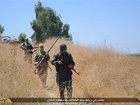Twitter users in Turkey could again access their accounts on Wednesday following an hours-long blockage after a court decision banning the publication of images of a deadly suicide bombing in all print, visual and online media, a Turkish official said.
"We notified Twitter about 107 URL addresses that must be removed in compliance with the court order," the official told AFP, saying that Twitter blocked those addresses after talks with the government.
 Full Story
Full Story
A young Turkish doctor who was pictured holding the hand of her friend in the aftermath of the suicide bombing on the Syrian border has survived her injuries and been transported to Istanbul for treatment, the Hurriyet daily said Wednesday.
In a picture that rapidly went viral on social media, two women were shown lying flat on their backs on the ground following the attack in the border town of Suruc that killed 32 people.
 Full Story
Full Story
Turkey on Wednesday identified the perpetrator of a deadly suicide bombing blamed on Islamic State (IS) extremists as a 20-year-old man from its southeast, as the government prepared new measures to protect the porous border with Syria.
With the country still shaken by Monday's bombing in Suruc, close to the Syrian border, two police were found shot dead in their homes in a nearby town but it was unclear if there was a terror link.
 Full Story
Full Story
The military wing of the outlawed Kurdistan Workers' Party (PKK) said on Wednesday it killed two Turkish police officers in a town on the Syrian border as a reprisal for a suicide bombing blamed on jihadists that killed 32.
"A punitive action was carried out... in revenge for the massacre in Suruc," the People's Defense Forces (HPG) said in a statement on its website, accusing the two officers of cooperating with the jihadists.
 Full Story
Full Story
Turkey said on Tuesday it had identified a suspect over a devastating suicide bombing on the border with Syria blamed on Islamic State jihadists, as the government rushed to bolster security on the porous frontier.
Thirty-two people were killed and more than 100 wounded on Monday when a bomb ripped through a crowd of young socialist activists in a mainly Kurdish region preparing to take aid over the border into Syria.
 Full Story
Full Story
A deadly suicide bombing in southern Turkey appears to be part of the Islamic State group's war against the Kurds, and shows the country's growing vulnerability to the conflict in neighboring Syria, analysts say.
The attack on Monday on a gathering of pro-Kurdish activists in Suruc along the Turkish-Syrian border, which killed at least 32 people, bore the hallmarks of the Sunni extremist organization.
 Full Story
Full Story
Turkey on Tuesday stepped up security on the border with Syria after a suicide bombing blamed on Islamic State extremists killed 31 people and raised fears of a spillover of the Syrian conflict onto its territory.
Monday's attack in a town on the border with Syria was one of the deadliest attacks in Turkey in recent years and the first time the government has directly accused the IS group of carrying out an act of terror on Turkish soil.
 Full Story
Full Story
A suspected Islamic State suicide bomber killed at least 31 people Monday in an attack on a Turkish cultural center where activists had gathered to prepare for an aid mission in the nearby Syrian town of Kobane.
The blast ripped through the center in Suruc -- a town just across the border from Kobane, which was itself later hit by a suicide car bombing -- blowing out the windows and starting a fire, witnesses said.
 Full Story
Full Story
Turkey's security forces detained nearly 500 people attempting to cross the border from war-torn Syria on Saturday, the army announced.
"488 people were detained by the land forces command border units while trying to cross into Turkey from Syria and 26 while attempting to cross into Syria from Turkey," the army said on Sunday in a statement posted on its website.
 Full Story
Full Story
Turkey is stepping up its role in the fight against Islamic State extremists after realizing the threats to its own security from jihadists and responding to pressure from its Western partners, analysts say.
Turkish security forces have over the last week arrested dozens of IS militants and sympathizers, in its most significant raids since the group began to seize swathes of neighboring Iraq and Syria in 2014.
 Full Story
Full Story



